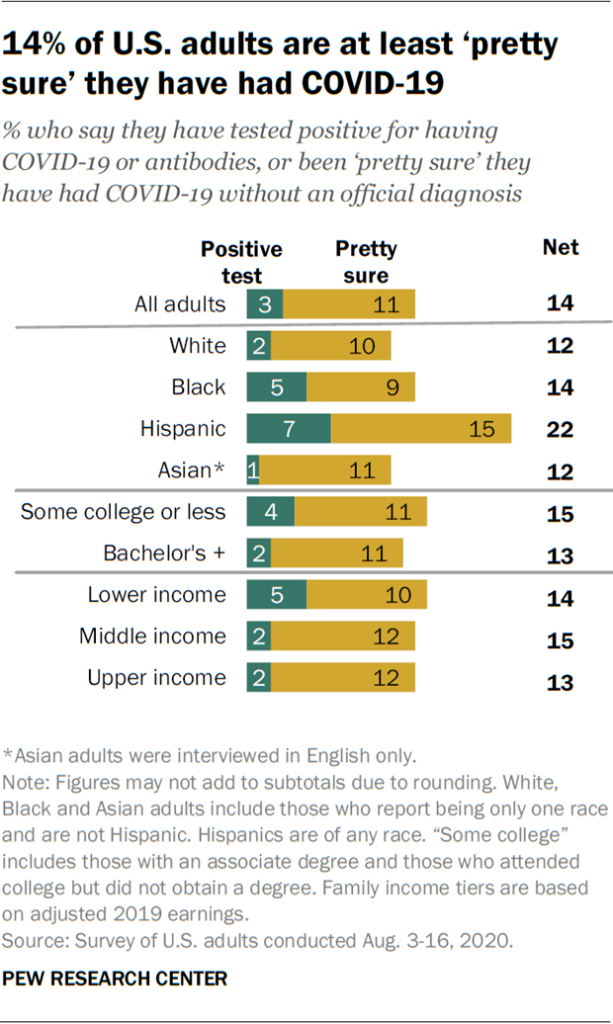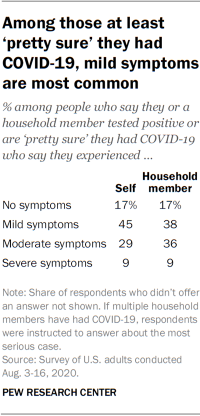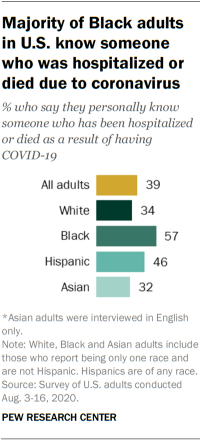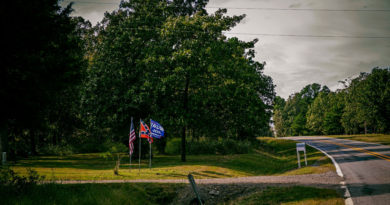1 in 7 US adults say they tested positive for COVID-19 or are pretty sure they had it

One-in-seven U.S. adults (14%) say they have tested positive for COVID-19 or are “pretty sure” they have had it despite not receiving an official diagnosis, according to a Pew Research Center survey conducted Aug. 3 to 16. The survey also finds a sharp increase since the spring in the share of Americans who say they know someone else who has been hospitalized or died due to COVID-19.

Overall, 3% of U.S. adults say they have personally tested positive for the coronavirus, according to the survey. That includes 2% who say they tested positive for an active viral infection – a share that comports with available public health data – and 1% who did not receive a positive test for the virus, but later tested positive for its antibodies, a sign of past infection. Another 11% of adults say they are pretty sure they have had the virus even though they were not officially diagnosed. (It’s important to keep in mind that these findings are based on self-reported information.)
Some groups of Americans are more likely than others to say they have personally tested positive for COVID-19. For example, larger shares of Hispanic (7%) and Black Americans (5%) report testing positive for COVID-19 or its antibodies than their White (2%) or Asian (1%) counterparts.
Pew Research Center conducted this study to understand more about the personal health effects of the coronavirus outbreak. The data was collected as a part of a larger survey conducted Aug. 3 to 16, 2020, among 13,200 U.S. adults. Everyone who took part is a member of the Center’s American Trends Panel (ATP), an online survey panel that is recruited through national, random sampling of residential addresses. This way nearly all U.S. adults have a chance of selection. The survey is weighted to be representative of the U.S. adult population by gender, race, ethnicity, partisan affiliation, education and other categories. Read more about the ATP’s methodology.
Here are the questions used for this analysis, along with responses, and its methodology.
Americans in lower-income families have also been disproportionately affected, with 5% saying they have received at least one positive test result, compared with 2% of adults in middle- and upper-income homes.
An educational gap is apparent, too. Among adults with some college education or less, 4% say they have had a test-confirmed case of COVID-19 – twice the share of those who have a bachelor’s degree or more education (2%).
The survey also asked Americans whether someone else in their household tested positive for COVID-19 or are pretty sure they have had the virus despite not receiving an official diagnosis. Overall, 14% of U.S. adults say they live with someone who has tested positive or been pretty sure they had the virus.

Most report mild or no symptoms
Nearly half (45%) of those who say they have personally tested positive for the coronavirus or its antibodies – or are pretty sure they had COVID-19 – say they experienced mild symptoms, while another 17% say they experienced no symptoms. Around three-in-ten (29%) describe their symptoms as moderate and 9% describe them as severe.
The pattern is similar among those who say another household member is at least pretty sure they had COVID-19. Around four-in-ten of these Americans say the other person in their household experienced mild symptoms (38%) and 17% report no symptoms. Some 36% report moderate symptoms and 9% say their fellow household member had severe symptoms.
Sharp increase in knowing someone who has been hospitalized or died due to COVID-19
The August survey also finds that around four-in-ten Americans (39%) say they know someone who has been hospitalized or died as a result of having COVID-19 – up from 20% who said this in late April and early May, the last time Pew Research Center asked this question. (Not all of the questions asked in the spring survey are directly comparable to those in the August survey.)

A majority of Black Americans (57%) say they personally know someone who has been hospitalized or died as a result of having COVID-19. Some 46% of Hispanic adults say the same, compared with about a third of White (34%) and Asian adults (32%). The share of Hispanic Americans who know someone who has been hospitalized or died due to COVID-19 has more than doubled since the spring survey, when 19% said this.
There have also been regional changes in the share of adults who know someone who has been hospitalized or died from the virus. In the spring, Americans in the Northeast (31%) were more likely than those in the Midwest (22%), South (18%) and West (13%) to say they personally knew someone who had been hospitalized or died due to the virus. Now, it is just as common for people in the South to know someone who has been hospitalized or died as it is for those in the Northeast to say this (43% vs. 46% – a statistical tie). In the August survey, about one-third (35%) of Midwesterners and 30% of those in the West say they personally know someone who has been hospitalized or died from COVID-19.
Note: Here are the questions used for this analysis, along with responses, and its methodology.





